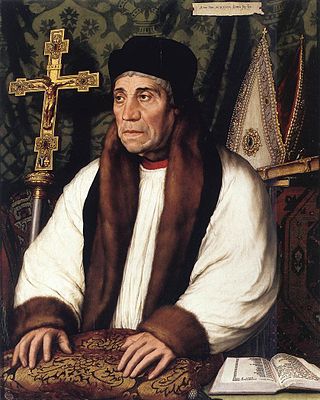Life
Netterville was appointed Archdeacon of Armagh about 1207. The diocesan chapter of Armagh in 1216 chose Netterville as archbishop, but their act was annulled on the ground that the assent of the Crown of England had not previously been obtained. After a money composition, a new election was held, under royal authority, and Netterville was appointed to the archbishopric. [1] On 6 July 1218 the king wrote to the pope saying he had given his assent to Netterville's election, and asking for papal confirmation. The pallium was sent to him from Rome, and he received consecration from Stephen Langton. [2]
After his return to Ireland in 1224, Netterville established the Saint Mary Magdalene, Dominican Friary in Drogheda for members of the Dominican order. He claimed the title Primate of Ireland, but Henry of London as Archbishop of Dublin maintained his claim to be the dominant Irish churchman. Netterville resided in Drogheda with the Augustinians, but was driven out at one point, and went to Llanthony Secunda. He died on 17 April 1227, and was buried at Mellifont Abbey. [2] [3]

William Warham was the Archbishop of Canterbury from 1503 to his death.

John Jebb was an Irish churchman and writer.
George Dowdall was a sixteenth-century Irish cleric, who was twice Archbishop of Armagh.
Events from the year 1224 in Ireland.
Milo Sweetman was a fourteenth-century Irish Archbishop of Armagh, who was noted for his fierce defence of the privileges of his archdiocese.
Events from the year 1227 in Ireland.

Henry Ussher was an Irish Protestant churchman, a founder of Trinity College Dublin, and Church of Ireland Archbishop of Armagh.

Christopher Hampton (1552–1625) was an Englishman who was the Church of Ireland Archbishop of Armagh from 1613 to 1625.
Thomas Lancaster was an English Protestant clergyman, Church of Ireland Archbishop of Armagh from 1568.
Richard Latewar (1560–1601) was an English churchman and academic, known as a Neo-Latin poet.
Luke (Lucas) Netterville was a sixteenth-century Irish judge. He was father of the statesman Richard Netterville and grandfather of the 1st Viscount Netterville.
Edward More (1480–1541) was an English churchman and educator, Archdeacon of Lewes from 1527 to 1541.
John Payne, Bishop of Meath, held that office from 1483 until his death in 1506; he was also Master of the Rolls in Ireland. He is best remembered for his part in the coronation of Lambert Simnel, the pretender to the Crown of England, in 1487.
Henry Jones was the Anglican Bishop of Clogher and Bishop of Meath.
James Spottiswood was a Scottish courtier and Protestant bishop of Clogher.
Maurice Sweetman was a 14th-century Archdeacon of Armagh.
Christopher Ussher, the uncle of Archbishop James Ussher, was Archdeacon of Armagh from 1591 until his death on 25 June 1597.
John Freind Robinson, 1st Baronet was Archdeacon of Armagh from 1786 until his resignation in 1797.
Donatus Ó Fidabra OCist was an archbishop in Ireland during the 13th-century.
Ralph de Norwich (c.1180–1259) was an English-born cleric, judge and Crown servant to King John and King Henry III, much of whose career was spent in Ireland, where he held office as Lord Chancellor of Ireland for several years. He was elected Archbishop of Dublin in 1256, but his election was vetoed by the Pope, on the grounds that despite his clerical office he was essentially a secular official, and too devoted to the King's interests to be a good servant of the Pope.
This page is based on this
Wikipedia article Text is available under the
CC BY-SA 4.0 license; additional terms may apply.
Images, videos and audio are available under their respective licenses.
 This article incorporates text from a publication now in the public domain : Lee, Sidney, ed. (1894). "Netterville, Lucas de". Dictionary of National Biography . Vol. 40. London: Smith, Elder & Co.
This article incorporates text from a publication now in the public domain : Lee, Sidney, ed. (1894). "Netterville, Lucas de". Dictionary of National Biography . Vol. 40. London: Smith, Elder & Co.


